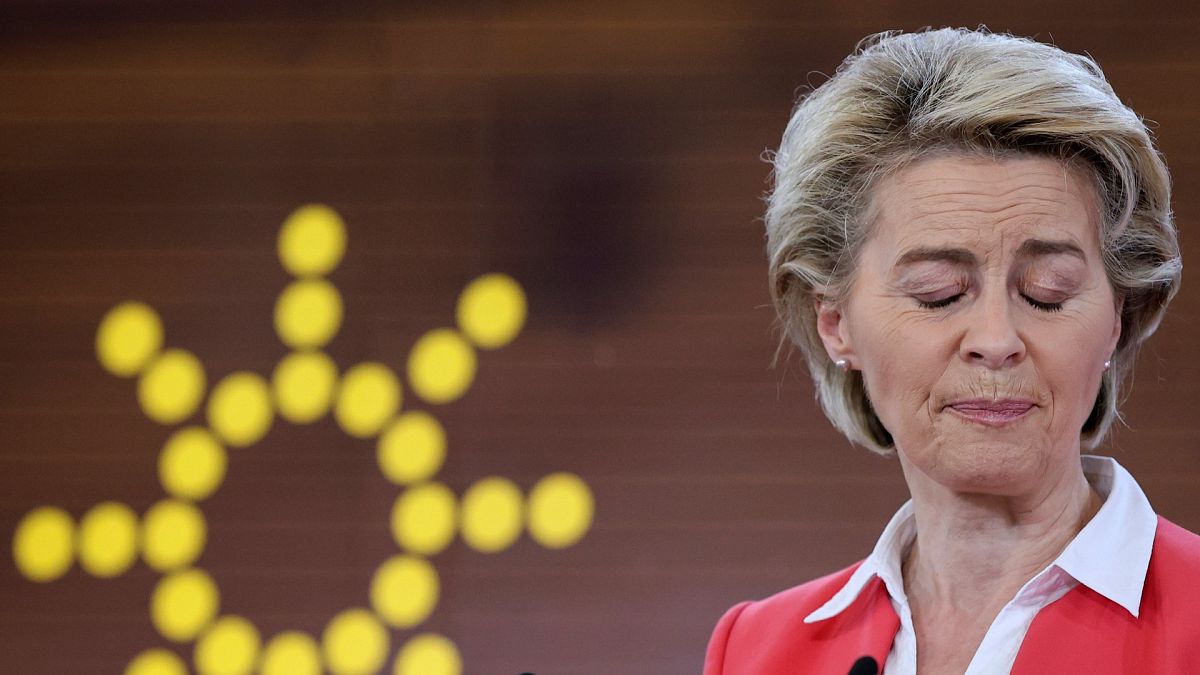Eight cringiest lines in EU Commissioners’ job applications

Twenty six hopefuls have sent MEPs their pitches to serve at the top of the next European Commission, due to take office within weeks. We’ve read them so you don’t have to.
Every job application has its cringe moments, and it’s no different for those hoping to serve in the next European Commission.
The European Parliament has just published the written responses sent by 26 candidates to join the EU executive, ahead of confirmation hearings due in early November – and Euronews has read them so you don’t have to.
Commitments to stand up for European ideals, offer gender equality and meet regularly with members of the European Parliament (MEPs) once in office are matched with specific policy pledges largely copied-and-pasted from President Ursula von der Leyen’s existing political guidelines.
But amid those lengthy lists of worthy promises – the most loquacious of which are over 20 pages – there are some truly buttock-clenching moments.
Here are some of them.
Luxembourg’s candidate to be agriculture commissioner briefly forgets that nobody likes a goody-two-shoes.
Hansen, like all other MEPs, could claim an allowance worth €350 per day for each day he’s present for official proceedings, which may have helped motivate him to show up.
But many MEPs do play truant, so well done to him for staying on the straight and narrow.
Von der Leyen cares about young people – she’s asked every single one of her top team to arrange a youth policy dialogue within their first 100 days in office, and annually after that.
While Séjourné’s certainly on the sprightly side for a European Commissioner, isn’t a 39-year-old claiming association with “the young generation” just a bit … well … cringe?
The EU adopted an algae initiative in 2022 and the future commissioner for fisheries and oceans is not shy of singing its praises.
According to the strategy, demand for algae – which has applications in cosmetics, pharmaceuticals and energy – could reach €9 billion by 2030.
The Commission promised, among other things, to “analyse availability of algae-related data” and to look at algae’s use as a foodstuff. Bon appetit!
Kallas, named in June by EU leaders as pick to be the High Representative – effectively the bloc’s top diplomat – isn’t afraid to name-drop.
She’s already followed her father Siim’s footsteps as Estonian prime minister and now is hoping to do so at the EU executive; he served as commissioner for transport and administrative affairs over a decade ago.
She’s hardly the first nepo baby in the EU bubble – European Council President Charles Michel is the son of ex-Commissioner Louis Michel – but is perhaps hoping playing the connections card could win her some precious extra votes.
The EU’s potential future financial services commissioner lays it on thick with prose that is giving us a big LinkedIn vibe.
During her three-hour hearing due on 6 November we expect her to ask MEPs on the Parliament’s Economic and Monetary Affairs Committee to add her to their professional network.
At just 35, Malta’s nominee promises to be the youngest member of the next European Commission.
It still seems he has fond memories of his internship in the EU institutions – and many of the hundreds who undertake the placements each year do.
Still, continuing to cite it on your CV as you apply to serve at the top of the EU executive might be a bit much.
Šefčovič, from Slovakia, sets out in crisp euro-English how he’d tackle the threat from an increasingly aggressive Chinese trade policy – something that’s recently led the EU to impose punitive tariffs on Chinese electric cars.
A former diplomat, Šefčovič is no stranger to the bureaucratic formulations that are all too standard in Brussels. Recall that the EU won its Nobel Prize for peace, not literature.
The controversial pick from Italy has been named Executive Vice-President for Cohesion and Reforms.
According to the mission letter von der Leyen sent him, he’ll be responsible for looking at the problems facing the bloc’s many islands – including helping with the reunification of Cyprus.
He’s set to face an intense grilling given his links to right-wing Prime Minister Giorgia Meloni – but at least he realises there’s a difference between Zealand and Ibiza.
Gerardo Fortuna and Jorge Liboreiro contributed reporting.
Related
ForexLive European FX news wrap: Euro stays buoyed, markets wait…
Headlines:Markets:EUR leads, AUD lags on the dayEuropean equities lower; S&P 500 futures up 0.1%US 10-year yields down 2.7 bps to 4.255%Gold up 0.4% to $2,9
European shares fall as tariff uncertainties weigh; US jobs data…
(Reuters) - European shares fell on Friday as frequent shifts in U.S. trade policy throughout the week resulted in risk aversion, while focus remained on th
US economy added 151,000 new jobs in February; Euro on…
US jobs report releasedNEWSFLASH: Hiring across the US economy picked up slightly at the start of Donald Trump’s second term in office.The US economy added 15












